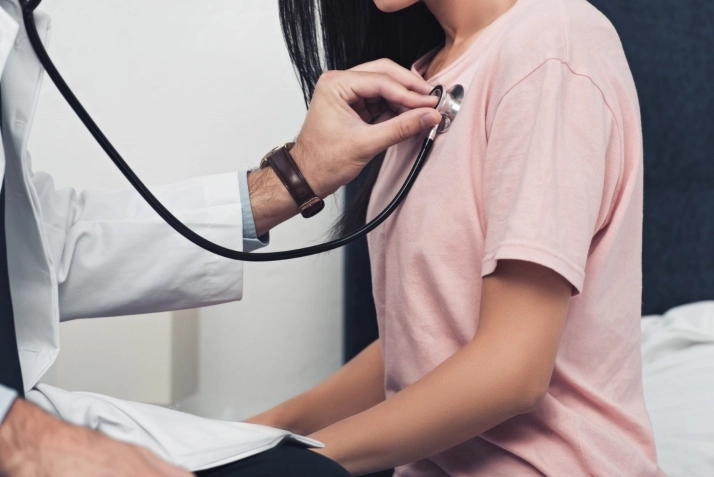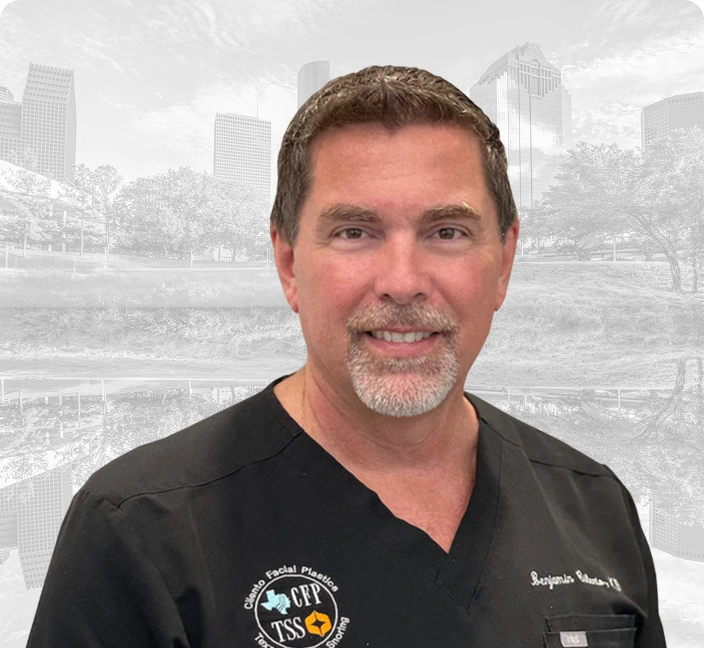Key Takeaways
- Sleep apnea is a common sleep disorder that can lead to serious health complications if left untreated.
- CPAP machines are the most widely recommended new sleep apnea treatments
for moderate to severe sleep apnea, but alternatives exist. - Oral appliances, positional therapy, and lifestyle changes are effective treatments for some people with sleep apnea.
- Surgical options are available for those who do not respond to other treatments./,li>
- Regular follow-up with a healthcare provider is crucial to managing sleep apnea effectively.
What Is Sleep Apnea and Why Treat It?
Imagine trying to breathe through a straw while someone occasionally pinches it shut. That’s a bit like what happens with sleep apnea. It’s a condition where your breathing stops and starts throughout the night. And it’s not just about snoring or feeling tired the next day. It’s serious because when you stop breathing, your body misses out on oxygen, which all your organs need to work properly.
Understanding the Condition
Sleep apnea comes in a few forms, but the most common is obstructive sleep apnea (OSA). It happens when the muscles in the back of your throat relax too much and block your airway. You might not know it’s happening, but your body does, and it wakes you up to get you breathing again. This can happen hundreds of times a night!
Health Risks of Untreated Sleep Apnea
Let’s get one thing straight: sleep apnea is not just an inconvenience. Leaving it untreated is like ignoring a ticking time bomb for your health. It can lead to high blood pressure, heart disease, type 2 diabetes, and even make accidents more likely because you’re so tired. That’s why treating it is not just about getting better sleep—it’s about staying healthy.
Gold Standard: CPAP Machines
So, what’s the best way to keep that airway open? The top tool in the toolbox is a CPAP machine. CPAP stands for Continuous Positive Airway Pressure. It’s a device that gently pushes air into your throat to keep the airway open. Think of it like an invisible hand holding that airway open all night long.
How CPAP Works
A CPAP machine has three main parts: a motor, a hose, and a mask. The motor draws in air from the room and pressurizes it. The hose carries this air to the mask, which you wear over your nose, mouth, or both. The steady stream of air acts like a cushion to keep your airway open. It’s a bit like inflating a balloon to keep it from collapsing.
Benefits of Using CPAP
One of my patients once said, “Using CPAP is like night and day. Before, I was always tired, and now I’m doing a 5K every weekend!” That’s the power of a good night’s sleep.
Most importantly, CPAP can drastically reduce or even eliminate the symptoms of sleep apnea. People who use it often report better sleep quality, more energy during the day, and a clearer mind. It’s not always easy to get used to, but it’s worth it for the zzz’s and the peace of mind.
Let’s take a break here and digest this information. In the next section, we’ll explore alternatives to CPAP and dive into lifestyle changes that can make a big difference. Because there’s not just one way to tackle sleep apnea, and finding the right solution for you is key to a good night’s rest and a healthier life.
Lifestyle Changes for Better Sleep Health
Before we jump into machines and surgeries, let’s talk about something you can start tonight – changing your lifestyle. It’s about making small tweaks to your day-to-day that can lead to big improvements in your sleep apnea symptoms.
Now, these aren’t just ‘good-to-have’ changes. They’re ‘need-to-have’. Because if you’re serious about tackling sleep apnea, the way you live plays a huge role. And the best part? These are changes anyone can make.
Think of it this way: your body is like a machine, and the fuel you put in it can either keep it running smoothly or cause it to break down. What you eat, how much you move, and even your sleeping position can all affect your sleep apnea.

Diet and Weight Loss
Let’s start with food. If you’re carrying extra weight, especially around the neck, it can press on your airway when you lie down. That’s why shedding a few pounds can sometimes mean a night-and-day difference in your sleep apnea.
- Focus on a balanced diet with plenty of fruits, vegetables, and lean proteins.
- Cut back on alcohol and caffeine, especially in the evening, as they can make sleep apnea worse.
- Stay hydrated, but avoid drinking lots of fluids before bedtime to minimize nighttime awakenings.
Exercise and its Impact on Sleep Apnea
Next up is exercise. I’m not saying you need to run a marathon. Even gentle, regular physical activity like walking or swimming can strengthen the muscles in your throat, making them less likely to collapse at night.
Exercise also helps you lose weight, which, as we just covered, can ease sleep apnea symptoms. Plus, it’s a fantastic stress reliever, and less stress means better sleep. Aim for at least 30 minutes of moderate activity most days of the week.
Surgical Interventions for Sleep Apnea
Now, what if lifestyle changes and CPAP machines aren’t cutting it? For some, surgery might be the next step. But remember, it’s not a first-line treatment and usually comes into play when other treatments have failed or if there’s a clear physical blockage or abnormality.
Surgeries can range from removing tonsils to more complex procedures that adjust the structure of your airway. It’s a big decision, so let’s break down when it might be considered and what it involves.
When Surgery Is an Option
Surgery might be on the table if:
- You have a physical blockage like large tonsils, a deviated septum, or a small lower jaw that’s contributing to your sleep apnea.
- You’ve tried CPAP therapy and just can’t get on with it, or it’s not effective for you.
- Your sleep apnea is severe, and other treatments haven’t reduced your risks for other health issues.
It’s essential to have a thorough evaluation by a sleep specialist and possibly an ENT surgeon to see if you’re a candidate for surgery.
Types of Sleep Apnea Surgeries
There are several types of surgeries for sleep apnea, each targeting different parts of the airway:
- uvulopalato pharyngoplasty (UPPP): This is where excess tissue is removed from the throat to widen the airway.
- Maxillomandibular advancement (MMA): The jaw is moved forward to enlarge the space behind the tongue and soft palate, reducing airway obstruction.
- Genioglossus advancement (GGA): This procedure tightens the front tongue tendon, reducing the risk of the tongue falling back and blocking the airway.
- Hyoid suspension: This involves securing the hyoid bone (in the neck) to the thyroid cartilage to help keep the airway open.
Each of these surgeries comes with its own set of risks and recovery times, so it’s crucial to weigh the pros and cons with your doctor.

Emerging Therapies for Sleep ApneaScience never sleeps, and that’s good news for sleep apnea sufferers. Researchers are always on the hunt for new treatments, and some of the latest developments are pretty exciting.
For instance, nerve stimulators that act like a pacemaker for the tongue can keep it from blocking the airway. There are also new types of oral appliances and even implants that can help.
Innovative Treatments on the Horizon
One of the most talked-about is hypoglossal nerve stimulation (HGNS) , more widely known as the Inspire® implant. It involves implanting a small device under the skin in the chest, which sends mild electrical pulses to the nerve that controls tongue movement, keeping the airway open at night.
Another area of research is looking at drugs that can target the muscles of the upper airway, helping them stay tense and open throughout the night.
The Role of Technology in Sleep Health
Wearable tech isn’t just for counting steps. Now, there are gadgets that can track your sleep patterns and even adjust your CPAP machine settings remotely. This means better, more personalized treatment without having to visit the doctor’s office as often.
Beyond Treatment: Continuous Care and Maintenance
Treating sleep apnea isn’t a ‘set it and forget it’ kind of deal. It’s an ongoing process that involves regular check-ins with your healthcare provider, keeping up with your treatment plan, and making sure any devices you’re using are in good working order.
For example, if you’re using a CPAP machine, you’ll need to replace the mask and hose periodically, clean the equipment regularly, and check in with your doctor to make sure it’s still the best treatment for you.
Importance of Follow-Up
Imagine your sleep apnea treatment as a journey rather than a quick trip. Regular follow-ups are the mile markers ensuring you’re on the right path. These appointments are your opportunity to discuss any challenges, adjust treatments, and celebrate improvements. They’re essential because your body changes over time, and so does the effectiveness of your treatment.
During these check-ins, your doctor might adjust the pressure on your CPAP machine, recommend different sleeping positions, or even suggest new treatments based on the latest research. It’s a time for tweaking and refining. Think of it as a regular tune-up for your sleep health.
And let’s be real, sometimes the treatments can be tough to stick with. That’s why these follow-ups are so important. They keep you motivated and on track. It’s not just about the numbers on a sleep study; it’s about how you feel during the day. Are you awake, alert, and alive? That’s the real goal.
Dealing with Common CPAP Issues
CPAP machines are amazing, but they’re not without their quirks. Dry mouth, stuffy nose, and those pesky mask lines on your face in the morning can all be part of the experience. But don’t worry, there are fixes for these issues.
- For dry mouth, try a CPAP with a humidifier or a chin strap to keep your mouth closed.
- If you’re getting a stuffy nose, a nasal saline spray before bed can work wonders.
- And for those mask lines, make sure your mask fits properly – it shouldn’t be too tight.
Remember, the key is to speak up about these issues. Your sleep specialist can help you troubleshoot them so you can keep using your CPAP comfortably and effectively.
What to Ask Your Doctor About Sleep Apnea Treatments
Preparing for a Sleep Study
Getting ready for a sleep study can be a bit like preparing for a mini-vacation – you want to pack the essentials. Bring your regular pajamas, your toothbrush, and anything else you need for your bedtime routine. The goal is to make the sleep lab feel as much like home as possible.
And just like going on vacation, you’ll want to avoid anything that could throw off your routine. So skip the caffeine and heavy meals before the study. You want the results to reflect your typical sleep, not a one-off night influenced by a double espresso.
Finally, be ready to answer questions about your sleep habits, like how often you wake up at night and what your bedtime routine looks like. The more information you can give, the better picture the doctors will have of your sleep health.

Questions for Your Follow-Up Appointments
When you return to see your doctor after starting treatment, come armed with questions. Ask about what your sleep study results mean, how you’re doing with your treatment, and what improvements you should be seeing. It’s also a good time to talk about any side effects you’re experiencing.
Here’s a tip: keep a sleep diary. Jot down notes about how you’re sleeping, how you feel in the morning, and anything else that seems relevant. This diary is gold for your doctor. It helps them understand your progress and make any necessary changes to your treatment plan.
Frequently Asked Questions
Can Sleep Apnea Disappear Naturally?
It’s a nice thought, but sleep apnea doesn’t usually just vanish on its own. If it’s caused by a temporary factor like a respiratory infection or weight gain, then addressing that issue could resolve it. But for most people, ongoing treatment is needed to keep sleep apnea in check.
How Do I Know If My CPAP Treatment Is Effective?
You’ll know your CPAP is working if you’re feeling more rested during the day, you’re not waking up as much at night, and perhaps your partner says your snoring has stopped. Your doctor can also check data from your CPAP machine to see how often you’re using it and if it’s preventing those breathing pauses in your sleep.
What Are the Side Effects of Oral Appliances?
Oral appliances are a great alternative for some, but they can cause jaw pain, dry mouth, or excessive salivation, especially when you first start using them. Over time, they can also alter your bite. That’s why it’s important to work with a dentist who specializes in sleep apnea to minimize these side effects.
Are There Any Natural Remedies to Reduce Sleep Apnea Symptoms?
Some folks find relief with certain “natural” approaches like yoga or playing the didgeridoo – yes, you read that right. The didgeridoo’s circular breathing technique can strengthen the throat muscles. Just remember, these aren’t substitutes for medical treatment, but they can be part of a broader approach to managing sleep apnea.
Is Surgery a Permanent Cure for Sleep Apnea?
Surgery can be a game-changer for some people with sleep apnea, but it’s not a guaranteed permanent fix. The success depends on the type of surgery and the individual’s specific circumstances. And even after a successful surgery, lifestyle factors like significant weight gain can bring sleep apnea back. So, it’s a potential solution, but not a universal one.
Conclusion
In conclusion, tackling sleep apnea is about finding the right combination of treatments for you. It might be CPAP, it might be an oral appliance, or it might be a lifestyle change. The key is to work closely with your healthcare provider, stay on top of your treatment, and keep looking forward to those good night’s sleeps. Because when you sleep better, you live better. And that’s what it’s all about.



